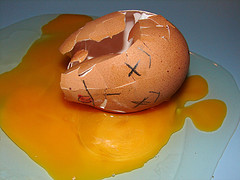Why Doesn’t Heat Flow Backwards?

Ah, the meaning of the Second Law of Thermodynamics! I might as well ask, What is the meaning of life? It’s a fascinating question and one that we can approach from a lot of different angles. Since this is a blog about building science and not physics or philosophy, I won’t go far down that rabbit hole, but let’s at least put a little life into this dry concept that seems to be the end of the discussion in so many home energy rater and building analyst classes.
The Second Law came after the First Law, of course. (So did the Zeroth Law!) That one says that scientists, in all the many ways they’ve studied the flow and conversion of energy, have never found that any closed system ends up with more energy than it started with or less energy than it started with. You may know this law as the Law of Conservation of Energy: Energy can be neither created nor destroyed.
In the process of studying the flow and conversion of energy, scientists had to confront the fact that heat pretty much always flowed one way: from hot to cold. Yes, you can move heat from cold to hot with a heat pump, but you have to do work to make it happen. Even in that case, however, the process of picking up heat from cold outside air and then dumping it into warmer inside air involves the flow of heat from warmer to cooler bodies.
A lot of discussions of the Second Law explain it by using the concept of entropy. I think an easier way to grasp it is with statistical mechanics. Naturally, we need to heed the warning from David Goodstein’s book, States of Matter, which was my introduction to the subject:
Ludwig Boltzmann, who spent much of his life studying Statistical Mechanics, died in 1906, by his own hand. Paul Ehrenfest, carrying on the work, died similarly in 1933. Now it is our turn to study Statistical Mechanics. Perhaps it will be wise to approach the subject cautiously.
Well, OK, we’re not going to go nearly as deep as they did, so fear not, intrepid explorers.
Think about the air in the room you’re sitting in right now. Are the molecules spread evenly throughout the room? Or are they clumped? Unless you’re in an extremely odd room, they’re spread evenly throughout. All those nitrogen, oxygen, and other gas molecules are bouncing around randomly and filling all the space in the room.
One of the things that statistical mechanics attempts to understand is the likelihood that a system, say the air in your room, can be in any particular state. One state might be that all the air is clustered up in one corner of the room, leaving you gasping for air. That state, it turns out, is so unlikely that we can say with a high degree of confidence that it will never happen.
Did you buy a ticket for the big lottery jackpot last week? Your odds of winning that were maybe one in 200,000,000. I didn’t because I don’t like throwing away money. Those odds just don’t appeal to me.
lottery jackpot last week? Your odds of winning that were maybe one in 200,000,000. I didn’t because I don’t like throwing away money. Those odds just don’t appeal to me.
When we’re talking about molecules rather than lottery tickets, the odds are way, way worse for that ‘jackpot’ that has all the air molecules in one corner of the room. First think of the number of particles involved. We’re talking Avogadro’s number here, or something on the order of 10 to the 23rd power. For the record, Avogadro’s number is:
602,000,000,000,000,000,000,000
When we start talking about all the possible states those molecules could be in, the numbers get crazy big. And the main result is that the odds for unusual states like all the molecules in one corner are miniscule. No, they’re smaller than miniscule. Take your odds of winning that lottery jackpot and divide by a million. Then do it again and again and again and…
In other words, it ain’t gonna happen.
Now, back to heat flowing from hot to cold, the same thing applies. Yes, heat from the room could flow into your cold coffee. It won’t, though, because the odds for states of matter like that are too low.
Another expression used in discussing this phenomenon is the Arrow of Time. If we run films backwards, a lot of what we see is funny because we know things can’t work that way. For example, the smoke in that photo at the top is diffusing throughout the air and becoming invisible. The state of those smoke molecules coming back together is so unlikely that we know if we see that happening, the film must be running backwards against the Arrow of Time.
Oscar Wilde nailed it when he said about Niagara Falls:
It would be more impressive if it flowed the other way.
Related Articles
How the Heck Does a Heat Pump Get Heat from Cold?!
What IS Heat Anyway? – Building Science Fundamentals
Photo of smoke column by Serhan Altug, used under a Creative Commons license. Photo of broken egg by aussiegall, used under a Creative Commons license.
This Post Has 11 Comments
Comments are closed.

To warm your coffee with the
To warm your coffee with the heat in the room, you need to start with an iced coffee.
One can conceive of another
One can conceive of another universe in which the clumping of gas molecules in one particular location happens all the time, and, assuming other conditions are right, life there evolves accordingly. Creatures in that universe would likewise ponder how improbable it would be for these clumps to just spread out evenly, and write about this on their blogs.
Also, I recall reading many, many moons ago how information theory also plays a significant role in all this, and is intimately related to the Second Law of Thermodynamics, entropy, and the arrow of time problems, which are probably all just manifestations of the same phenomenon, in the end.
The information theory ramifications are that only certain types of knowledge of things are possible; you can’t have knowledge of the future, only the past, for example; or the fact that there is a general loss of information or resolution going from the subatomic to the molecular to the macro level. All fascinating stuff, but it was too long ago for me to remember many of the details!
Ron:
Ron: Touche!
John P.: Yes, the rabbit hole is deep and winding. It helps if you get up in the morning and believe at least 6 impossible things before breakfast.
Hint: Molecular activity.
Hint: Molecular activity.
Or Ron..to get “hot
Or Ron..to get “hot coffee”, you could start with a room that is about 150 degrees. Anybody here practice Bikram Yoga (“Bikram” being Indian for “Houston”)
Yes, and it’s also possible
Yes, and it’s also possible that entropy production will cease and the universe will achieve heat death in our lifetime.
@Bill: that was my thought.
@Bill: that was my thought. On a reverse note, in the winter, I put beverages meant to be consumed cold in the garage (and have to monitor the temp so that they don’t freeze).
Bikram Yoga (“Bikram” being Indian for “Houston”): If you mean, did I ever watch Houston practice when Yogi was a coach there, then yes. It was often hot and humid.
Some very interesting
Some very interesting information and comments. Keep up the good articles, although this one got maybe a little too deep!
Ah, the prolific propensity
Ah, the prolific propensity for ponderous prose. Let’s consider fractionation for a second. In refrigeration, using the latest refrigerants to help save the polar bears and the ozone layer(I’m all in on that)requires blended refrigerants. These blends do in fact fractionate, seperate, migrate, into their own little communities when not handled properly, and you don’t have to force them to do so. And you could say they do so at a chemically bound semi-molecular level, questioning the aforementioned and wonderfully postulated odds of such an occurance.
However, inside any particular refrigeration system, we don’t recognize this process as a problem because it does not manifest a problem in performance. Also, Dalton’s law states these gasses will exibit one pressure, even though they do seperate within a given volume of space into distinctly different pressures. So how do they act as one? Like the air we are discussing?
Let’s not forget Calculus and the law of limits here. I mean, my fingers never actually, mathematically touched the keyboard, yet I typed. It is never exactly what/where/when/why/how we think it is. If it was, then we would have only one Physics, one set of laws.
Since we can’t make our minds up, isn’t each viewpoint a wonderfully sophistic argument? Specifically on this posting, since the door was opened so widely.
Oh, and John, we do in fact have all sorts of knowledge of the future, as long as we don’t bring along any strings, as in theory. Talk about a can of worms…..
You guys have WAY too much
You guys have WAY too much time on your hands…
W. Keith Powell, I agree it’s
W. Keith Powell, I agree it’s possible to have a certain knowledge of the future. I’ll even proffer that time is not strictly linear, as most think. But knowledge of the past is still quite fundamentally different from knowledge of the future, and I would claim that this is a result of entropy. Now if you’ll excuse me, I need to go crack open another brewski! 😀